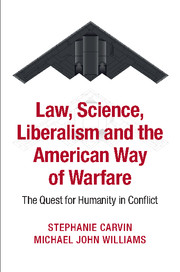Book contents
- Frontmatter
- Contents
- Prologue
- Introduction
- 1 Law and science in the Western way of war
- 2 The American way of war
- 3 Vietnam and the “science” of war
- 4 Immaculate destruction: reorganization, revolution and re-enchantment of War
- 5 Revolution denied: the “war” on terror
- 6 Back to the future?
- Index
- References
5 - Revolution denied: the “war” on terror
Published online by Cambridge University Press: 05 December 2014
- Frontmatter
- Contents
- Prologue
- Introduction
- 1 Law and science in the Western way of war
- 2 The American way of war
- 3 Vietnam and the “science” of war
- 4 Immaculate destruction: reorganization, revolution and re-enchantment of War
- 5 Revolution denied: the “war” on terror
- 6 Back to the future?
- Index
- References
Summary
Kind-hearted people might of course think that there was some ingenious way to disarm or defeat an enemy without too much bloodshed, and might imagine this is the true goal of the art of war. Pleasant as it sounds, it is a fallacy that must be exposed: war is such a dangerous business that the mistakes which come from kindness are the very worst.
Carl von Clausewitz, On WarFollowing the success of Operation Desert Storm to oust Iraq from Kuwait, the US establishment felt that they had finally rid themselves of the dreaded body-bag syndrome that had haunted US policy-makers since the Vietnam War. Technology and the law had come together to wage a war so effective that the US military had managed to topple their adversary in a matter of days. The victory came with the loss of few American lives, the objective quickly met and the international coalition was successfully maintained. The campaign was critiqued from a number of angles, but the sum total of America’s engagement was seen within the establishment as an unmitigated success. This experience would fuel those in the military establishment and the civilian policy world who felt that by harnessing newly emergent technology they could eliminate the “fog or war” identified by Clausewitz, giving the United States the ability to see the entire field of battle and to dominate it with high-end technology resulting in similar successes in future wars.
- Type
- Chapter
- Information
- Law, Science, Liberalism and the American Way of WarfareThe Quest for Humanity in Conflict, pp. 157 - 200Publisher: Cambridge University PressPrint publication year: 2014



